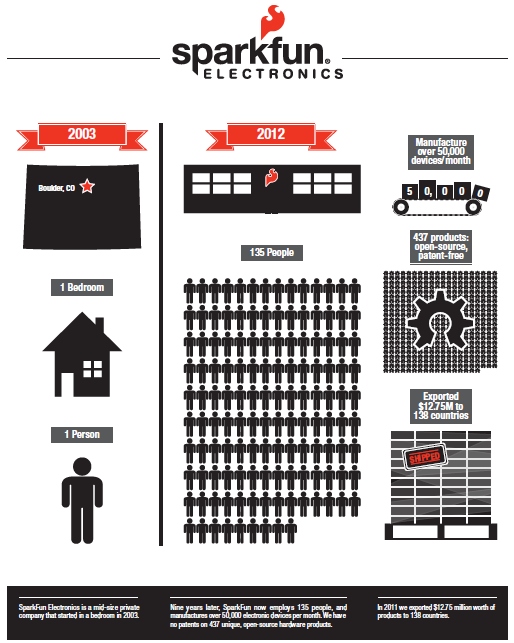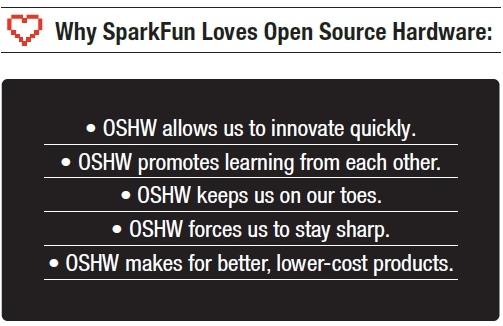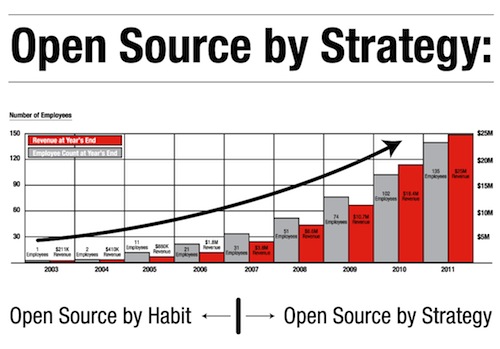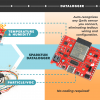We're going to let this post ride for another day - the conversation going on below is great. Please continue to discuss this! And don't forget to take the survey!
Catarina Mota, David Mellis, and John De Cristofaro have put together a survey for the open source hardware community. The goal of the survey is to have a better understanding of who we are as a community, as well as why and how we use/make open-source hardware. If you participate in OSHW, and are interested in giving us a better description of the community, please take the survey! The survey will be up until April 15, and the aggregate results will be made publicly available in the form of a report consisting of graphics, percentages, and anonymous quotes.
On a separate note, I want you to come visit me in DC! I will be attending a nifty get together called OH/DC put on by Michael Weinberg of Public Knowledge on Friday April 20th, 1 to 5PM. I plan to be part of panel to speak to policymakers about open source hardware - what it is, why it's a good thing, etc. Michael assures me there is nothing to be worried about but I'm slightly terrified to breakout the one button-down shirt I own and head to the capital, so please come help!
The public is invited! For the Hill/policy people, this will probably be their first contact with OSHW. The best way to make this a success (and myself less terrified) is if we can get OSHW fans to attend. It will reinforce to the policy folks why people are excited by this new type of business model.
After the panel there will be a bit of a science-fair feel as the various businesses demo what it is they do and talk to the various movers and shakers on the Hill about why it's important. Michael's goal of the panel is to expose policymakers to OSHW so that when legislation comes up, they will have some previous knowledge about why OSHW is good. I think this is a fantastic idea and a great way to plant some seeds before OSHW becomes mainstream.
So if you're near Washington DC this lovely spring please swing by the Rayburn House Office Building and say hi! This will be a great way to get a glimpse of how policy is made.










That is a great business history and a great example of the American dream. Good work!
Good luck Nate!
I may work for a Fortune 500 company, but I didn't get to where I got without the help of Sparkfun and the Open Source community back in college. Being able to use Sparkfun's tutorials and products I was able to complete my degree and end up as a verification engineer. Still to this day, I bring up tutorials and products the Open Source community uses to my friends, family, and co-workers with their own projects.
I owe a lot of my success to the Open Source community (Software AND Hardware). I try to give back to the community when I can, but working as a verification engineer, the hours can get quite hectic and it's hard to contribute. However, I try my best by answering people's questions, and trying to put out widgets, articles, and tutorials from my experience to the community.
Again, good luck and Godspeed.
Washington isn't a scary place. Your business and OSHW actually dovetails nice with the Department of State's recent push in Economic Statecraft (info http://www.state.gov/r/pa/pl/2012/184182.htm) as it is always good to align your success with a Federal initiative (even if they are not related, they have similar goals).
I may wear a button down shirt to work, but there is an EE underneath, the boundary layer doesn't result in a rash :) And if you want to see the world and play with technology, there are opportunities http://careers.state.gov/specialist/vacancy-announcements/seo
A Sparkfun Fan
Awesome! Coming to DC! I work on Capitol Hill, and will definitely be there for part of it. For anyone coming in, I would definitely recommend using METRO because there's not much in the way of public parking around, unless you want to walk a lot. You could park down South Capitol street and then go catch the Washington Nationals game vs. the Marlins after the meeting - The stadium is a 1 mile walk from the Rayburn, straight down South Capitol street. For metro, choose the "Capitol South" stop, and when you come up the escalator, walk to the top of the block and turn left to walk down the hill. Dont forget to check out the Air and Space museum, or the American History Museum while you're in town. Both are awesome for geeks.. :-)
Hope to see lots of SparkFun people here!!
Nate, I hope you will explain to Policy people that Sparkfun (and its coleagues & customers) are limited to "unfinished goods" because of the Tyranny of the FCC - which is currently has the Raspberry Pi held up in FCC purgatory - depriving millions of Children in the US the opportunity to learn basic programming on a $25 computer. (etc...)
And think what Sparkfun etc... could export if it were granted wider latitude to innovate and sell more complete products.
Just saying, a little liberty once and while?
I know this isn't a place to bring up politics, but Ron Paul wants to abolish the FCC. I'm honestly not sure how I feel about that.
Which, IMHO, is a perfect example of the old expression "throwing the baby out with the bath-water." Like any real organization (as opposed to purely theoretical ones), the FCC has a number of frustrating flaws. However, the sum total of what's wrong with the FCC is far less of a problem than what would happen if we didn't have some sort of way to manage the extremely limited electromagnetic spectrum.
After all, we don't live in the second decade of the 20th century; back when only scientists, inventors, some militaries, and a paltry few commercial radio broadcasters were using radio frequencies. Instead, we live in the second decade of the 21st century, where many people in the USA own multiple devices which are based on RF transcievers (e.g. cell/smart phones, wi-fi connected computers, bluetooth devices, cordless phones, CB and other civilian radios, walkie-talkies, garage door openers and similar RF remotes, etc...). Even if they don't own any such devices they probably utilize communications technology that requires RF of some form such as TV (all forms broadcast, satellite, and cable use RF at some point in their distribution), AM and FM Radio, and even landline phones can use satellites for long distance calls. Then you have all the electrical and electronic devices that don't intentionally transmit RF but if poorly made or unshielded will cause significant interference.
Simply put, in order for any of the RF dependent devices to be as functional as we currently enjoy there has to be some mechanism to ensure the myraid of RF devices designed and made by different entities "play nice with each-other". I'm not contending that we can't or shouldn't try to improve the FCC, especially it's handling of OSHW; just that the suggestion of abolishing it and not implementing some alternative form of nation-wide spectrum managment is not a realistic plan. At least, not if we intend to use RF technology anywhere near as heavily as modern developed nations currently do.
The main problem is that the FCC has too many industry ties and they tend to favor large corporations while passing regulations that limit innovation.
To fix the problem, you really have to abolish the FCC altogether and put one or more smaller agencies in place with a new top level staff. Larry Lessig, a Stanford professor, recently proposed a new agency to replace the FCC that would intervene in public affairs as little as possible while protecting innovation.
Take a look at this article.
How about we have the professional groups, like IEEE, who are impartial to businesses, run the "Play Nice" type policy? I mean, they're the ones that come up with the standards, why not let them handle the laws on them? We've all seen that our government is filled with politicians who don't know anything on what they're talking about.
There are a lot of arguments for and against what I mentioned, but the issue all boils down to ethics. Which agency/group is going to have the ethical and moral requirements to do this? Will they have the backbone to say "No" to a corporation or individual who is trying to lobby them?
Either way, the system is a Charlie Foxtrot of Bravo Sierras.
The fundamental reason we can't just have IEEE take over for the FCC is that their standards are based on mutual consent. If you have some entity that doesn't want to "Play Nice", for whatever reason, they will create devices without regard to issues like interference and that can not only hamper economic activity it can put people at great risk. Most consumers don’t know and probably don’t really care to know the frequencies their devices use; they just want them to work. Therefore if you only have consensual standards; it’s entirely possible for a product to be marketed to the general populace that doesn’t “play nice” with frequencies used by emergency responders or air traffic controllers, and for people to buy and use them unknowingly use them in a dangerous manner. IMHO, one fatal incident caused by due to unintentional RF interference by an unmodified commercial device is one too many, and the current FCC system (even with its flaws) prevents the almost all accidental interference by non-tech savy end users.
Of course it's possible to give non-governmentally produced standards the force of law, but that approach has its own potential issues. One of these is having laws you have to pay to read. Also, while IEEE is currently an impartial organization, many of its members are also corporate employees. How long do you think it will take before large corporations start to encourage employees that are also IEEE members to become members of the standards making committees and encourage them to think of their employer’s best interests when creating or modifying these standards? I agree large corporations currently have too much influence on the FCC and other parts of the U.S. Government, but at least said corporations can’t directly employ the people on the standards making bodies and that’s a much larger potential conflict of interest than the current system allows.
As you stated it all comes down to ethics and the ability to say “No” to rich and powerful interests when what they want is against the public interest. However, IMHO, the best way society can limit corruption is to come down hard on both the corruptor as well as the corrupted. It’s a sad and dangerous attitude I often see expressed that while rightly decrying the excessive influence and corruption of public institutions by private interests, ignores those very private interests as if they were doing nothing wrong despite being the instigators of the malicious acts. It’s as if a neighborhood gathered to inspect the damage caused by a carload of teenagers driving on front lawns and mowing down mailboxes, decided that it was a horrible situation, but excused the actual perpetrators because “kids will be kids”!
Ha, you said Pi. Love the "depriving millions of children" part. Don't worry, after the FCC comes the dumping complaints and millions of innocent school children will be safe from King George's Linux board and British tyranny for a while longer! (I think is it is heading towards $50+)
Wow. I wish I could see a complete breakdown. 11 people on $880k revenue??? Maybe it was 2 at the beginning of the year and 9 were added part time in the last month? Wait, how much are you charging these people to work there? By the way, if Nate tells any Feds he has a mid-sized company they will assume he means 500 or more employees. Careful how you throw these terms around in front of the policy makers (who get to define what they mean). They might get an idea. Remember the scariest words in the English language, "Hi, I'm from the Government and I'm here to help".
Not to make less of what Sparkfun creates, but let's get real about the true benefit of "open source hardware" to SFE or other such companies: most open-source hardware is simply incorporating closed-source hardware connected on PCBs in the same manner as outlined in application notes released by manufacturers. Sparkfun has the means to build the Open Source Hardware in-house, which is where the major money actually is.
We, as hobbiests and hackers, also benefit because most of us do not have this capability, nor access to many of these chips that can only be purchased at reasonable prices in quantity. This has been the same since the dawn of time, and OSHW is simply another manifestation of how markets work.
Yup, that's the major benefit of shops like Sparkfun. When I think of the state of DIY electronics before this massive availability, I think of rummy shops like Radio Shack where you were at the mercy of their selection and information. Closed or open source hardware: the access to that hardware, even something as simple as a breakout board, is extremely valuable.
I agree with your observation of the SFE business model.
I have always had the question, if you open source all software how do you pay software engineers. Open sourcing everything moves the business incentives to producing hardware and inserting yourself in the supply chain. Some say that software can sell the hardware, but in many cases it is the software that gives value to the hardware. Case in point look at the app store. If everything was free and open source you would remove the incentive for developers to clean up their work or actually bug track. If you follow open source software 9/10 you will find that the people developing either have steady jobs or it's being used on a resume to better their career.
Im not saying that open source is bad, I there are people that don't understand that behind every apt-get there is thousands of man hours that you are not paying for.
There is no free lunch...
Brennen, I'm reporting you to the Heinlein fan club! Everything you mention here depends heavily on OPM - taxes. Academic, scientific, the arts? We need to be looking someplace real for this to work out. (I know you guys like hanging with the art chics. Every time Sparkfun has an artsy home page I just hang my head and mutter "It isn't going to work". It took a science woman to even begin to find Howard interesting).
We Also Walk Dogs, eh? Unlimited Limited? I have the same experience with the .edu, etc. and they are key early adopters, though not as bleeding edge as the real enthusiasts. (Beagle, Panda, Shiva, now Pi, are hot briefly then in the desk drawer with all the others - at least Arduino has serious staying power and usefulness). But the edu and gov are buying at a discount because they are using your money. They even take your money these days (your productivity, a percentage of your lifetime) and patent any useful material for licensing. When I was a kid everything NASA did was open source/open hardware and published with full details. If you consider selling to .edu as seed money, I can agree. However, this one bothers me "The thing is, it doesn't make any sense, outside of some narrowly interpreted market-fetishist fantasy". It sounds like 99 percenter slogans. I worked at Apple when we were really bucking the trends and I used to stop in on Milton Freedman and some of his fellow Hoover dwellers on the Stanford campus. I have a pretty good idea of what is real in the market and what isn't. I'm not a naysayer and intend to open source and open hardware a batch of new designs. Our stuff is used to teach embedded Linux at the Paul Allen Center at the U of W and the u of cal campuses. I have a potential "game changer" coming out and seriously want to open the whole project. As a witness working many years in the science divisions of colleges, I stand by the art chic gets free work from geek phenomenon. Lets call it unrequited -um- work. The productivity lost to crushes is incalculable. To paraphrase Ginsberg, "I saw the best minds of my generation destroyed by women" :-) (Not trolling or looking for flames).
True enough, but I didn't apply a gender to the destroyed minds. If you are interested in the morphology of such things, I can send you examples from Apple and the SF Poetry Slam scene. Find a copy of "Compass in an Armored Car".
However, I am more interested in the future and the open hardware model for a successful business. I'm not worried about being copied. It MUST depend on the fact that the customer does not have the time, inclination, or means to copy the hardware, and that multiple sources builds a better user community and more trust in long term availability. It fly's in the face of traditional thinking, the venture groups who always ask if you have a patent, or who ask what prevents you from being copied. The elevator pitch is pretty much worthless at this point and there needs to be an alternative business model, which I assume will be a topic of this conference. I could point to Sparkfun and say "Its like that", but Sparkfun is on the small end of the small business category and has a LOT of people for its revenue. You have to grow employee count by a factor of 5 to even qualify as mid sized. So, who are the big examples, or are we breaking new ground? I don't want to stick ads all over my products like Google.
"I make my living in large part working with open code. "
So how do you generate revenue?
You (Sparkfun) sell tangible products. If Sparkfun did not produce the hardware it designed it would not exist. Im not saying this is bad in any way. Sparkfun does a great service to developers but I feel that this is a major point not addressed by the OSHW/SW movement. If you are not producing a tangible product or acting as a support contractor (Red Hat) how do you generate revenue?
You have a one button shirt. Nice!
The plot on revenues and employees seems to have an error in the x-axis. It starts with 2003 then it goes to 2004 and it repeats 2004.
Otherwise the data presented on the panels are awesome. Good luck in DC.
Thank you! Good eyes. I'll get that fixed before we head to DC. (If SparkFun wrote a book, we could have it proof read in about 5 minutes by you guys.)
Speaking of which, when are we gonna write that book?
Challenge Accepted.
Write the book and we (sparkfunians) will crowd-source the proofreading with a total elapsed time of 5 mins!
The next FreeDay challenge?
Since the open-source hardware, you guys should thinking about expand your area into other countries like China, NorthKorea, India. Cause they have great demand for entry-level hardware and the cost is unexpecttedlly low. And there are also a lot of Foreign Spark Fans like me. Wish Sparkfun goes well!
The graph is fixed in the post - we'll get the new PDF posted shortly!
My roommate works in that building, so I sent him the link and he checked it out... said he had a good time. I sent him with an nRF24L01+ module to get signed... hope that wasn't too awkward. ;-) I've got a whole box of Sparkfun stuff on my desk, but I had a hard time finding anything big enough for a signature. :-P
I wish I could have made it but I was working, and I avoid DC like the plague... especially on a weekday.
Hey - I was there, and the guy in front of me had a Sparkfun module autographed.. Must have been him! I work for House of Reps too, so HAD TO go. Friends of mine came into town for it, so we started with a tour of the Capitol, so we got there a little late, but listened to the last 45 minutes or so of the panel, and then met all the awesome people who are making a business out of enabling my electronics habit.
I KNOW that visit has sealed the deal, and it's only a matter of time before I have a 3d printer and an open source CNC. :-)
Plane tickets booked. See you there!
I totally want to make a foam hat in the shape of the OSHW logo.
What do people think of the "First to File" patent reform bill from 2011, a.k.a. the America Invents Act?
Where is today's news post? ITS 12:21PM!!!!
I added a note to the top of today's post - we're going to let this one run an additional day. We want to get some more responses to the survey and continue the conversation going on here in the comments. We'll have some fresh content up first thing tomorrow! Thanks for reading!
Thanks for adding the note! Also, may I suggest adding a note when/if you let a post go for more than a day?? Please????
Also I saw this tutorial a while back, (about 3-5 months ago), and looked at it again this week and it seems to have changed... Does it still say the same stuff that it said before it was edited?
Edit: I ask because when I first saw it about 3-5 months ago, I knew from the bottom of my SparkFun composed heart, that having SFE selling something in that sort of setting would be the very peak of happiness in my life's timeline!
I've never used a feed, will try and figure them out then if SFE has them...
I use Google Reader and an Android app called feedr at the moment. They're generally less than optimal; sooner or later I'll probably figure out a different solution, but they work for the time being.
If you use Firefox, you could also just add a "live bookmark" pointed at the feed you want. I do this for stuff I keep close tabs on, like comments here and GitHub actions.
I run Windows 7 w/ Google Chrome...
Also I still could use some help with this:
Exactly what help do you need? We periodically update these to provide the best information and advice we can, which is what is up there now. There may have been minor changes but the gist is the same.
Also one last question for today, How likely is it that SF will like my widget enough to sell it on the BEST website ever?
That depends on how AWESOME your widget is! (Seriously though, read that tutorial closely, it has lots of very good advice).
more comment nesting!!!
Thanks!
PS: I just wanted to make sure SFE are still looking for the same things that they did when I read the outdated post.
Another thought came to me as I read the comments. Linox come to mind. Having to deal with closed source software for years, coughmicrosquirtcough cough, I can really appreciate the openness of Linox. So good luck with your presentation. Also, as a tech writer, I agree, you put a book out, it can be proofed before the electrons fade from our screens.
AH-HA! So your the one who took my first name as their user name!! Good job!
Good luck Nate, They will hear you, you've done it right. ~jd warren
Washington? this is near me for once!!!!!!!!!
I took the survey, and good luck with your nifty get together!
The most impressive i think is the $211k rev by Nate alone in 2003. Very interested in what the future has in store for SF. Every X month there is a nice post like this, but always looks back. What are SFs plans?
You think we have a plan? Hah! I was hoping I could open-source it.
For reals, our plan is the education market. Not the high-school physics class, but the everything class where electronics have not normally been found. I keep telling folks you don't need a EE degree to play with this stuff. Now we plan to prove it.
Cmac's right about revenue vs profit. I didn't have the funds to buy a real winter jacket until 2006. New companies eat cash like it's their business.
As a testament to the "...you don't need a EE degree to play with this stuff" comment, behold Jeri Ellsworth:
http://youtu.be/cLy0mVkoLio
Plans are for girly boys...
From what I see, companies that take off is because the founder had a great idea and stuck to that idea (Boeing, Microsoft, Apple, Data-IO, to name a few). And yeah the founder has to really sacrifice to get that growth - aka no real winter jacket for awhile... But that does not mean you don’t invest in good equipment to get you where your going.
Though I hear wearing an Open Source Habit and wheeling a big micrometer does help.
Well, $211K is revenue - not profit. But still pretty good for a one man operation. Nate himself can, I'm sure, answer this better than I, but SparkFun's plans for the future are always changing. That is part of the beauty of Open Source because it allows us to adapt and change quickly and as a business, we make a conscious effort to always "be on our toes" so to speak.
Open source also usually results in inferior technology. Use with salt.
I initially hid this comment, because it struck me as outright and deliberate trolling. I looked and you've been a regular commenter here for a while, so I'm gonna unhide it, but I'll point out this isn't exactly a constructive way to engage with a group of people who've staked their business and community on the opposite proposition.
Open source hardware and software often has less funding. The dedication of the engineers and developers behind open source technology makes up for this lack of funding.
Also, open source projects allow users to provide constructive criticism at the source level. Some users even branch off of open source projects and create their own renditions of devices and programs, allowing for innovation at a much quicker rate than the innovation that occurs in most closed source projects.
I appreciate you sharing your opinion. However, it may be more compelling if you shared some empirical evidence to reinforce your position. I agree that without supporting data an overtly negative statement of opinion does lean heavily toward trolling as Mr. Bearnes suggests.
The concept of inferior technology is subjective. To me it implies restricted functionality - DRM, copyright, proprietary functions. A device that I buy yet have to treat as if I was borrowing it from someone is inferior to one that I build with my own hands, or one that comes from the open source community.
Business-wise, open source means high output per unit of capital input resulting in efficiency and flexibility. You won't be driving Hummers or Ferrari's, but you'll not be burning as much gas either (metaphorically speaking).
Closed source hardware has resulted in exploding laptops, unrepairable appliances & tools, and FOGBANK. Use with... erm... fire extinguishers, a voluminous trash can, and a big budget?
On a more direct note, I receive non-working goods far more often from closed source providers than open source providers. The only non-working open source goods I've received were explicitly sold as such. In the end, however, that's simply because the open source hardware tends to be produced by companies controlled by people who are not as willing to accept quality compromises to achieve cheapness (Wall St. favors cheap and quarterly, open source requires reputation to keep making sales). The FOGBANK example shows the real problem.
I've spent good money on both and both have their place and market. I will continue to spend money on open source whenever possible/practical. The support is community based Vs. "tech support" based, the solutions include "try A. B. and C." rather than "send it back and pay us to try to fix it" and my system does what I want it to and not what someone from who-knows-where wants it to. Obviously the market has spelled out a demand.
I wonder if you could get Bruce Perens to write an opinion piece (better, attend - but that may be costly). He's a proponent of 'open source' hardware and prefers the TAPR OH license, but does have some critiques of OSHW, and is very much involved with openhardware.org .
Whoaa! You guys had some awesome growth in 2004! Keep it up!
Wow Nate! That's awesome... I'd come if I could :(
BTW... fix your "Open Source by Strategy" slide... maybe it's just me, but I'm seeing 2003 2004 2004 2004 2004 2004... on the x-axis.
I'm excited for you... let me know if you want me to proof-read any more of your slides ;)
POP QUIZ!!!!
Q: What do you get when you combine an awesome product with an awesome website, with an awesome manual, that when combined is just way too awesome that it becomes Chuck Norris roundhouse kicking a cloned Chuck Norris!??!
PS: Please DO NOT star this comment or the ones bellow so all can see!!!
THE CORRECT ANSWER IS...
A: ______________________________
Reserved for future laughs and giggles!
Also reserved for future laughs and giggles!